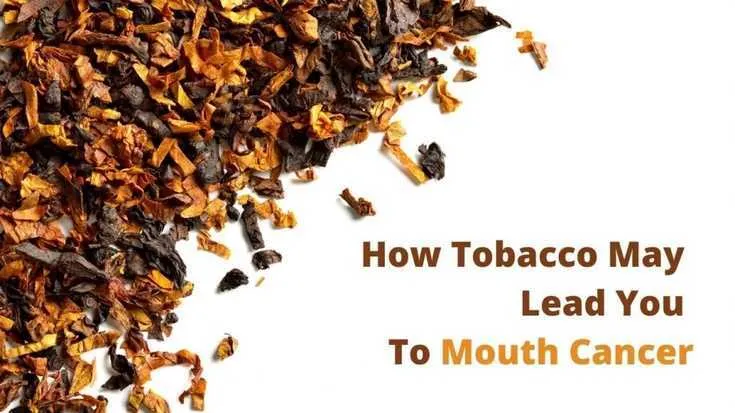Overview
Mouth cancer is one of the deadliest cancers when it comes to humans. It can occur on the lips, tongue, cheeks, palate (roof of the mouth), and gums.
Each year, there are about 77,000 new cases of mouth cancer diagnosed in the India each year. It is often diagnosed late due to a lack of general awareness about the disease, and as a result, the five-year survival rate for mouth cancer patients is only around 50%.
This is why it’s important to learn about all of the risk factors associated with mouth cancer, including tobacco use. Tobacco use is by far the biggest risk factor for developing mouth cancer, and smokers are six times more likely to develop the disease than nonsmokers.
In this blog post, we’ll discuss how tobacco use leads to mouth cancer, some of the other risk factors for this cancer and we’ll also explore some of the prevention strategies and treatments for mouth cancer.
Mouth Cancer & How it affects organs in the mouth
Mouth cancer, also known as oral cancer, is a type of cancer that affects the lips, tongue, cheeks, gums, palate (roof of the mouth), and other tissues in the mouth. It is a deadly disease, with an estimated 52,000 deaths each year in India alone
While mouth cancer can affect any area of the mouth, it most commonly occurs on the tongue or on the floor of the mouth. The early signs and symptoms of mouth cancer include:
- A sore or irritation that doesn’t go away
- A lump or thickening in the mouth
- Bleeding from the lip or mouth
- A white or red patch on the lining of the mouth
- Loose teeth
- Difficulty chewing or swallowing
- Persistent hoarseness or sore throat
If you experience any of these symptoms, it’s important to see a doctor right away so that they can rule out other causes and determine whether or not you have mouth cancer.
Tobacco use & How it increases Your Risk of Developing Mouth Cancer
- Pipes
- Cigars
- Chewing tobacco
- Snuff
- Bidis (flavoured cigarettes)Tobacco use is the number one risk factor for developing mouth cancer. In fact, smokers are six times more likely to develop the disease than nonsmokers.There are many different ways that tobacco use can lead to mouth cancer. First of all, tobacco contains a variety of harmful chemicals that can damage the DNA in cells and cause them to mutate.These mutated cells then go on to form tumours. Additionally, tobacco use also decreases the production of saliva, which is important for washing away harmful bacteria and keeping the mouth clean. This can create an environment in the mouth that is conducive to cancerous cell growth.
In addition to cigarettes, other forms of tobacco that can increase your risk of developing mouth cancer include:
What Chemicals Found in Tobacco are Carcinogenic?
Cigarette smoke contains more than 7000 chemicals, including at least 70 that are known to cause cancer. These carcinogenic chemicals can damage the DNA in cells and lead to the development of tumours. Some of the most harmful chemicals found in tobacco smoke include:
- Tar
- Nicotine
- Carbon monoxide
- Benzene
- Styrene Aromatic amines
In addition to these carcinogenic chemicals, tobacco smoke also contains a number of other harmful substances that can damage the lungs, heart, and blood vessels. These include:
- Arsenic
- Cadmium
- Lead
- Hydrogen cyanide
- Ammonia
Are You at Risk for Mouth Cancer?
In addition to tobacco use, there are a number of other factors that can increase your risk of developing mouth cancer. These include:
Heavy alcohol use: People who drink alcohol heavily (defined as more than three drinks per day) are two to three times more likely to develop oral cancer than people who don’t drink alcohol at all
HPV infection: Human papillomavirus (HPV) is a virus that is spread through sexual contact. There are certain types of HPV that are linked to an increased risk of developing cancer, including mouth cancer
Oral piercings: Oral piercings can damage the tissue in the mouth and make it more susceptible to infection. This, in turn, can increase the risk of developing mouth cancer
If you have any of these risk factors, it’s important to talk to your doctor so that they can keep an eye out for early signs of the disease.
What kind of Cancers Tobacco may cause other than Mouth Cancer?
Tobacco use is linked to a number of different types of cancer, including:
Lung cancer: Lung cancer is the leading cause of cancer death in both men and women. Smoking is responsible for about 85% of lung cancer cases
Esophageal cancer: Esophageal cancer is a type of cancer that affects the esophagus, the long tube that runs from the throat to the stomach. Smoking is linked to a higher risk of developing this type of cancer
Pancreatic cancer: Pancreatic cancer is a type of cancer that affects the pancreas, an organ in the abdomen that helps with digestion. Smoking is thought to be responsible for about 25% of all pancreatic cancer cases
Kidney cancer: Kidney cancer is a type of cancer that affects the kidneys, two small organs in the abdomen that filter blood. Smoking is linked to a higher risk of developing this type of cancer
Bladder cancer: Bladder cancer is a type of cancer that affects the bladder, a hollow organ in the pelvis that stores urine. Smoking is linked to a higher risk of developing this type of cancer
In addition to these types of cancer, tobacco use is also linked to an increased risk of developing a number of other diseases, including:
- Heart disease
- Stroke
- Chronic obstructive pulmonary disease (COPD)
- Emphysema
- Pneumonia
While quitting smoking is the best way to reduce your risk of developing these diseases, there are a number of treatments and preventive measures that can help. Talk to your doctor about what you can do to protect your health.
Prevention & Treatment Strategies for Mouth Cancer
The best way to prevent mouth cancer is to avoid tobacco use altogether. If you do use tobacco products, quitting is the best thing you can do for your health. Quitting smoking is hard, but there are a number of resources available to help you, including:
- Counselling
- Smoking cessation programs
- Nicotine replacement therapy (gum, patches, lozenges)
- Prescription medications
If you’ve been diagnosed with mouth cancer, treatment will depend on the stage of the disease. Early-stage mouth cancer can often be treated with surgery, while more advanced stages may require a combination of surgery, radiation therapy, and chemotherapy.
Mouth cancer is a serious disease with potentially deadly consequences. However, by avoiding tobacco use and being aware of the early signs and symptoms of the disease, you can catch it early and increase your chances of successful treatment.
If you have any questions or concerns about mouth cancer, talk to your doctor. They can help you understand your risk factors and develop a plan to keep yourself healthy.
Tobacco cotains a chemical that can cause damage to DNA cells and might lead you to oral cancer. In this blog, we’ll know how tobacco leads to oral cancer.






